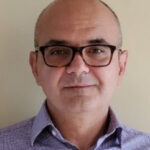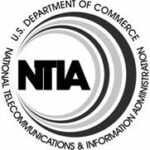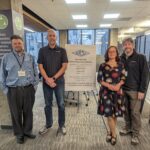Radio Shop Chat: Reviewing wireless broadband technologies in the peak smartphone era: 6G versus Wi-Fi 7 and 8
SpectrumX invites you to the next Radio Shop Chat, “Reviewing wireless broadband technologies in the peak smartphone era: 6G versus Wi-Fi 7 and 8,” featuring Dr. Edward Oughton, assistant professor, George Mason University, on Wednesday, June 5, 1 p.m. E.T. / 10 a.m. P.T.
Registration is required and free.
Register here.
Abstract: With the arrival of the peak smartphone era, users are upgrading their smartphones less frequently, and data growth is decelerating. To ensure effective spectrum management decisions, policy makers require a thorough understanding of prospective wireless broadband technologies, current trends and emerging issues. Here, we review the sixth cellular generation (‘6G’), in comparison to two new Wi-Fi standards, including IEEE 802.11be (‘Wi-Fi 7’) and IEEE 802.11bn (‘Wi-Fi 8’). We identify three emerging issues necessary for successful telecommunication policy. Firstly, evidenced-based policy making needs to be able to measure effectively how much demand takes place where and how. Thus, new datasets are needed reflecting real usage by different wireless broadband technologies, for indoor and outdoor users. Secondly, with data consumption growth slowing, there needs to be an urgent reassessment of spectrum demand versus allocation. Past forecasts do not reflect recent data and regulators urgently need to re-evaluate the implications for spectrum management. Finally, regulators need new and improved Lifecycle Impact Assessment metrics of cellular versus Wi-Fi architectures, to support successful policy decisions which mitigate energy and emissions impacts.
 Bio: Edward is best known for developing spatial decision-support models of broadband infrastructure, having carried out broadband strategy assessments for countries around the world. This research provides evidence on the effective strategies to connect more people to a faster Internet, which is vital for ensuring sustainable economic development. Edward’s research is highly multi-disciplinary, drawing on engineering and computer science analytical techniques, to answer new questions pertaining to policy, innovation, planning, economics, and sustainable development. Having been awarded over $1.7 million in research funding (PI: $1.05m, Co-PI: $0.22m, Other: 0.43m), Edward has been PI/Co-PI for projects funded by many organizations including the National Science Foundation, International Monetary Fund, World Bank, Cisco, Meta (Facebook) Connectivity Lab, Canadian Space Agency, Airbus, Dutch Ministry of Economic Affairs, HM Treasury’s National Infrastructure Commission, UK Department for Transport and UK Met Office. Edward holds an MPhil and PhD from the University of Cambridge and completed post-doctoral research at the Cambridge Judge Business School Centre for Risk Studies. Prior to GMU he was a Senior Research Associate at the University of Oxford where he retains an Honorary position.
Bio: Edward is best known for developing spatial decision-support models of broadband infrastructure, having carried out broadband strategy assessments for countries around the world. This research provides evidence on the effective strategies to connect more people to a faster Internet, which is vital for ensuring sustainable economic development. Edward’s research is highly multi-disciplinary, drawing on engineering and computer science analytical techniques, to answer new questions pertaining to policy, innovation, planning, economics, and sustainable development. Having been awarded over $1.7 million in research funding (PI: $1.05m, Co-PI: $0.22m, Other: 0.43m), Edward has been PI/Co-PI for projects funded by many organizations including the National Science Foundation, International Monetary Fund, World Bank, Cisco, Meta (Facebook) Connectivity Lab, Canadian Space Agency, Airbus, Dutch Ministry of Economic Affairs, HM Treasury’s National Infrastructure Commission, UK Department for Transport and UK Met Office. Edward holds an MPhil and PhD from the University of Cambridge and completed post-doctoral research at the Cambridge Judge Business School Centre for Risk Studies. Prior to GMU he was a Senior Research Associate at the University of Oxford where he retains an Honorary position.
The SpectrumX Radio Shop Chats are a collegial debate on the pressing issues and optimal model for managing spectrum, as a complex interplay among technology, economics, law, and policy. All Radio Shop Chats are held under the Chatham House Rule.
 SpectrumX invites you to our next Radio Shop Chat: “Reviewing wireless broadband technologies in the peak smartphone era: 6G versus Wi-Fi 7 and 8” presented by Dr. Edward Oughton, assistant professor, George Mason university, on Wednesday, June 5, 2024, at 1 p.m. ET / 10 a.m. PT
SpectrumX invites you to our next Radio Shop Chat: “Reviewing wireless broadband technologies in the peak smartphone era: 6G versus Wi-Fi 7 and 8” presented by Dr. Edward Oughton, assistant professor, George Mason university, on Wednesday, June 5, 2024, at 1 p.m. ET / 10 a.m. PT



